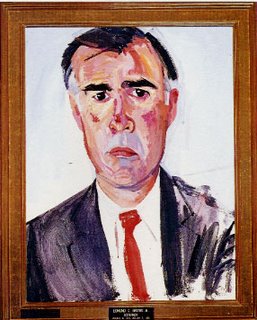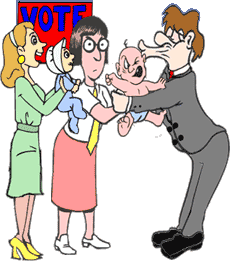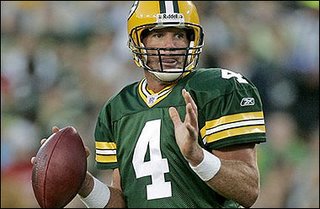
There are fewer better explainers of evolution than
Richard Dawkins. There are also fewer bigger critics of religion than he, and perhaps it's no wonder. No field of science has been attacked more directly, consistently, or successfully than evolution in recent years so it's unsurprising that someone who had decidated his professional life to understanding and advancing that field of knowledge would feel besieged.
I just watched a ninety-minute piece that Dawkins made for the BBC going outside of Dawkins' own field of scientific inquiry (evolutionary biology) and exploring the role of religion in Western society. You can see them here, in two parts -- part one is called "
The God Delusion" after his most recent book, and part two is called "
The Virus of Faith." Unfortunately, the last segment is cut off about halfway through, although you can get a good sense of where he is going with it before it ends.
Those among the Loyal Readership who adhere strongly to monotheistic religions should be warned. These videos will make you mad. Not only does Dawkins take the (I think) unremarkable position that people without a belief in God are every bit as moral and compassionate and interested in building a good society as theists are, but he goes so far as to suggest that quite often, belief in God gets in the way of morality and in some cases, provides a moral whitewash for things that are downright evil.
The title of the series, according to some sources, was not Dawkins' idea and he claims to have objected to it. I suspect he would have preferred to have used the title of his book rather than the title assigned to the series by the BBC, which suggests that there are limits to even his tolerance for confrontational rhetoric.
But, there is a telling moment early on in the show. Dawkins is accused by a minister in Colorado of arrogance, and I think the shoe fits. (The minister, himself, comes off as wanting in humility, too.) For all of his professing that science and a rational approach to life is fundamentally humble and anxious for being proven wrong, he spends very little time offering a defense for what he proposes in discussions of issues like evolution, Biblical inerrancy, political and individual freedoms, and the morality of (for instance) abortion. He proceeds instead as if it were a given that he was correct, which is not a particularly productive stance to take if meaningful dialogue is the objective. Rather, Dawkins often appears to be picking a verbal fight for the sake of getting good copy on camera. Granted, the subject of his documentary is not evolution but rather religion and morality; there is no pretense that this documentary, like any other, is unbiased and neutral in its approach to its subject. All the same, the discussions of evolution and faith left me wanting more on that subject and less attempts to protray obviously intelligent people who disagreed with Dawkins as rubes and hucksters because they drive big American pickup trucks.
He also seems to have selected outrageous or extreme examples of the religiosity which he so roundly criticizes. For instance, he found an American Jew who moved to a kibbutz in Israel and then converted to Islam -- who launched into a virulent attack, full of hate and ignorance and religious zeal against the sexual excesses of Western society and the moral intolerability of atheism. While Dawkins claimed to have been surprised by the man's attitude during their interview, that seems a little bit facile. The recent convert, and particularly a convert who has undergone so extreme a religious transformation, is bound to possess very strident views.
One thing that Dawkins described, while visiting another fundamentalist Christian church in the United States, is a phenomenon I had never heard of before -- the
Hell House. Terrifying and somewhat gory portrayals of various kinds of politically unpopular sins, like abortion or gay marriage, are enacted in a live stage format that is intended to terrify the audience. An actor with an outrageous stage presentation and flame-red hair to play the role of Satan, gleefully refusing to let a woman who changed her mind about getting an abortion up from the operating table where her womb was being mangled, and presiding over a marriage ceremony of two women smirking at one another. He forgot one of his lines about how evil homosexuality was an had to be cued by the pastor, breaking character. The pastor organizing the Hell House Dawkins toured quite freely admitted that he hoped that children as young as twelve would come see the show and be scared, horrified, even terrified into accepting Jesus as their saviors and following the moral commandments of the Bible as a result of what they had seen. Dawkins called this "child abuse." It's worth a view to decide for yourself if the pastor or Dawkins hit the nail closer to the head.
Now, I must admire Dawkins for not conceding the point that atheists are any less moral than theists, he also did not give these people much of a chance to explain why they believe what they believe. He also mentions, in several places, that he believes that most of the people he has spoken to are well-meaning and that not all practicioners of religion are so extreme in their expressions of faith. But his concessions ring hollow as the soundtrack plays Elvis singing "Onward, Christian Soldiers."
In apparent effort to demonstrate that America is a more diverse land than a country of Christian fundamentalists, Dawkins also attends a meeting of "freethinkers" which reminded me in tone and content very much of the group in Tennessee that I enjoyed participating in so much. In that sense, it made me miss many of those friends from Knoxville. But it also made me think of my religious friends from Tennessee, none of whom seemed to have any of the really unpleasant or disturbing qualities of the people Dawkins interviewed. More than anything else, having the experience of knowing these people makes me question Dawkins' choice of interview subjects.
Dawins did interview a "moderate" Anglican priest, and shot some of his most pointed criticism at this man and notes ironically that his criticism of the religious moderates is the same as that of a religious fundamentalist. If you're going to claim to believe in a religion and miracles and God and all of that, don't do it by half measures. After all, how are we to pick and choose what parts of the Bible are real and what parts aren't; the Bible is either true or it is not and nothing in the Bible gives the reader a guide as to how to segregate putative allegories from putative literal reports of historical events. Just because a religious moderate says or believes something that is generally pleasing does not make it either logically or theologically correct.
Of interest to anyone is the way that overtly anti-religious propaganda reflects on its subject. Intellectually, Dawkins' special did not cover any new ground in my thinking or knowledge, at least not for me -- although he did present some of the arguments in a very direct and in-your-face way that seemed almost calculated to offend and shock people of faith. This seems new to me, both in its overt disapproval of all religion as well as in its confrontational tone.
While at the end of the day, I agree with the bulk of Dawkins' message, I really wish he had found a more respectful way of presenting that message than what was on the BBC special. If you're interested in Dawkins' ideas but would prefer to see them expressed in a more humorous and less confrontational format, you might want to consider
his book plug on the Colbert Report. The Colbert interview wound up being more about evolution than religion anyway.
 No trick-or-treaters came by the house tonight. The Wife and I did step out for about forty-five minutes to get some milk and bread at the grocery store (and almost got killed by a really foolish teenage driver, but that's a different story). So it's possible that we just missed them all. But I doubt it, even though there are a lot of houses with kids in them up and down the street.
No trick-or-treaters came by the house tonight. The Wife and I did step out for about forty-five minutes to get some milk and bread at the grocery store (and almost got killed by a really foolish teenage driver, but that's a different story). So it's possible that we just missed them all. But I doubt it, even though there are a lot of houses with kids in them up and down the street. 








































